 |
Secretariat exhibits interactive, user-friendly electronic toolkit during the 2013 COPs.
Toolkit for Identification and Quantification of Releases of Dioxins, Furans and Other Unintentional POPs released
The revised edition of the Toolkit contains improved dioxin emission factors for sources and technologies typical for developing regions, and emission factors for other unintentionally produced POPs.
Additional guidance is also provided on the collection of activity data, updating and revision of inventories, quality assurance and quality control of inventory results, among other aspects.
The revised Toolkit is now available in an interactive electronic version via CD-ROM and at https://toolkit.pops.int.
The Toolkit will be on display in the Secretariat of Basel, Rotterdam and Stockholm Conventions' exhibition booth during the 2013 conferences of the parties.
|
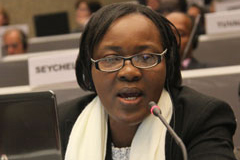 |
Selection of branch chiefs to fill the technical assistance, convention operations and scientific support branches has been announced by the Secretariat.
Secretariat fills three senior management positions
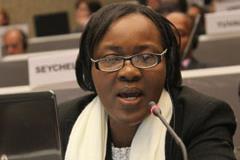 The Secretariat of the Basel, Rotterdam and Stockholm Conventions is pleased to announce the selection of Branch Chiefs for three of its four branches.
Abiola Olanipekun has been selected as Chief of the Scientific Support Branch.
Ms. Olanipekun has been heavily involved in the conventions, and has had a leadership role in its meetings for many years. Ms. Olanipekun worked for the Federal Ministry of Environment Nigeria (1987 to 2013) in the Chemicals Management Division of the Department of Pollution Control & Environmental Health and has coordinated the African region for over a decade in major international negotiations, policies and programmes on sound management of chemicals. She holds a Bachelors of Science and Masters Degree in Biochemistry and Environmental Science and Technology respectively from University of Benin, Nigeria and UNESCO-IHE, Delft, The Netherlands.
Ms. Olanipekun will officially join the Secretariat on 25 April 2013.
Maria Cristina Cárdenas-Fischer has been selected as Chief of the Technical Assistance Branch.
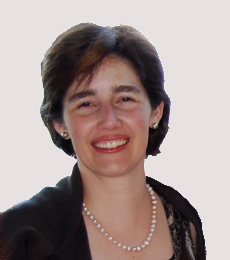
Ms. Cárdenas-Fischer Ms. Cárdenas-Fischer has served as acting chief of the Technical Assistance Branch of the Secretariat since February 2012. She joined the Stockholm Convention Secretariat in October 2001 as a policy advisor, and over the years she has been responsible for managing the areas of work of the Secretariat pertaining to technical assistance (including the regional centres for capacity building and transfer of technology), the financial mechanism under the Convention, the national implementation plans, the reporting obligations and the expert group on BAT and BEP. From October 2009-February 2012 she was the coordinator for the technical assistance programme of the secretariat of the Stockholm Convention.
Prior to joining the Stockholm Convention Secretariat, Ms. Cárdenas-Fischer, worked for the Colombian Ministry of Foreign Affairs (1993 to 2001) as special advisor for environmental issues. Ms. Cárdenas-Fischer is a Colombian national and holds a BA in Philosophy from Bristol University in the United Kingdom.
David Ogden has been selected as Chief of the Conventions Operations Branch.
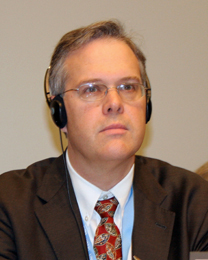
Mr. David Ogden Mr. Ogden has served as the acting chief of the Convention Operations Branch of the Secretariat since February 2012. He joined the United Nations Environment Programme in March 1997 and served as the coordinator of the Stockholm Convention through its negotiation and following its entry into force. He chaired the coordinators group that was responsible for the organization and conduct of the first simultaneous extraordinary meetings of the Basel, Rotterdam and Stockholm Conventions in February 2010.
Mr. Ogden worked for the United States Environment Protection Agency from 1987 to March 1997 mostly within the Office of International Affairs where he served as the lead analyst for international chemicals management issues. Mr. Ogden holds a Master of Science degree in Environmental Science, a Master of Arts degree in International Affairs, a Bachelor of Science degree in Political Science and a certificate to teach social studies at the secondary level. He is an American.
|
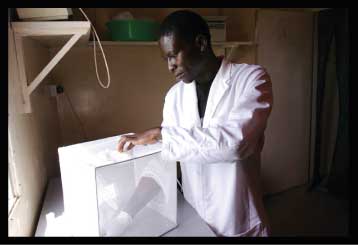 |
Richard Mukabana, coordinator of the Stockholm Convention Regional Centre in Kenya at icipe, discusses the importance of this new role to IVM programmes.
icipe’s Role as a Stockholm Convention Regional Centre
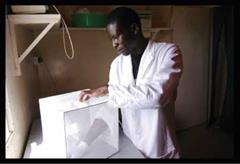 In July 2010, icipe was selected as a regional centre under the Stockholm Convention on Persistent Organic Pollutants (POPs). Below Richard Mukabana discusses the importance of this new role in regard to the icipe’s integrated vector management (IVM) programmes.
Q. What is the Stockholm Convention on POPs?
A. The Stockholm Convention is a United Nations international environmental treaty, which was signed in 2001, coming into effect in May 2004. Its aim is to protect people, animals and the environment from chemicals (POPs) that are highly dangerous with long-lasting deleterious effects.
The Convention endeavours to achieve its goals by restricting and ultimately eliminating the production, use, trade, release and storage of POPs. Its implementation is overseen by the Conference of the Parties (COP), through decisions taken during periodic meetings. In addition, several institutions have been selected as regional and sub-regional centres, with the mandate of assisting developing countries to fulfill their obligations under the Convention, through capacity building and transfer of technology.
Q. How did icipe’s appointment as a Stockholm Convention Regional Centre come about?
A. By 2005, there were two Stockholm Convention regional centres in Africa: the Basel Convention Regional Centre in Senegal and the National Centre for Cleaner Technology Production in Algeria. As these two centres are located in Francophone Africa, the Secretariat of the United Nations Environmental Programme (UNEP) found it necessary to have additional regional centres, to cater for Anglophone Africa.
In accordance, UNEP conducted an assessment, which identified icipe as a potential regional centre of the Stockholm Convention on POPs. The process of having icipe formally endorsed was overseen by two scientists: John Githure, the former head of the Human Health Division, and Charles Mbogo, who is currently a visiting scientist at icipe. The two scientists made a strong case based on icipe’s past accomplishments. Since its founding, icipe has remained committed to developing environmentally safe tools and strategies for the management of arthropods. An example of this is the Centre’s integrated vector management (IVM) programmes. icipe’s IVM strategies incorporate different approaches to control mosquitoes in adult and larval stages. This approach includes scaling up the use of long-lasting insecticidal nets, larval control using Bacillus thuringiensis israelensis (Bti), community education, sensitisation and mobilisation.
icipe’s suitability as a regional centre was also supported by its leading role in articulating issues surrounding DDT, one of the pesticides regulated by the Stockholm Convention. The use of DDT was banned in most industrialised countries in the 1970s
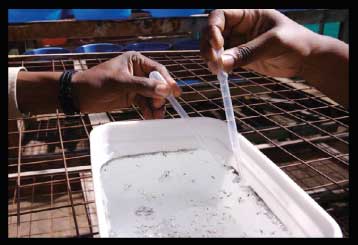
Mosquito eggs in water
inside a semi-sealed
mosquito rearing
facility at icipe. The
Centre’s IVM strategies
incorporate different
approaches to control
mosquitoes in adult and
larval stages, which are
first tested for efficacy in
the laboratory.
Photo: Santiago Escobar 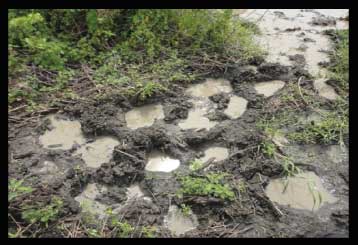
As part of its role as a
regional centre under the
Stockholm Convention, icipe
plans to create linkages with
government partners to ensure
the consideration of IVM in
national policies. Among
the issues to be addressed,
are environmentally safe
approaches to eliminate
mosquitoes, for instance by
tackling their breeding sites,
which include these hoof
prints made by hippopotami.
Photo: Santiago Escobar
based on evidence of its risks to human, animal and environmental health. Currently, COP allows the use of DDT for public health interventions, for instance in the control of malaria-transmitting mosquitoes, through indoor spraying by national health authorities under the supervision of the World Health Organisation (WHO). Today, there are about 11 countries that use DDT – most of them in sub-Saharan Africa.
icipe believes that, in addition to its documented hazards, the use of DDT has wider implications, for instance, the possible rejection of horticultural and fish exports from Africa to European markets in view of tightening restrictions on insecticide residues on products. In addition, there is widespread resistance to DDT in mosquito populations in Africa, meaning that the pesticide does not offer a sustainable solution to their control.
As a result, since 2000, icipe has been working with WHO and UNEP to assist countries in Africa to reduce their reliance on DDT for malaria vector control, mainly through training on alternative IVM strategies. The Centre’s researchers have participated in several COP meetings to articulate alternatives to DDT. icipe is also part of the ‘Stop-DDT Alliance’, which also includes the Washington-based Millennium Institute and the Biovision Foundation of Switzerland.
Q. How does the selection as a regional centre under the Stockholm Convention advance icipe’s mission?
A. Under the Stockholm Convention, the global community has committed to reduce and eventually eliminate reliance on DDT worldwide by assisting countries adopt safer and more effective alternative malaria control approaches. icipe considers the up-scaling and integration of IVM strategies to be a key element towards this goal. However, the Centre recognises that many stakeholders working in mosquito and malaria control do not have the evidence, or the access to decision-making processes, that are key prerequisites for the adoption of IVM strategies.
The appointment of icipe as a Stockholm Convention regional centre provides the Centre with the opportunity to strengthen the capacity of partners in Africa towards the incorporation of IVM into national strategies. Since 2010, icipe has organised three major training workshops on IVM as an alternative solution to the use of DDT for malaria vector control. The first five-day session, held in June 2010, was attended by 18 public and environmental health specialists from nine countries in the eastern and southern African region. The workshop, which was facilitated by researchers from the Kenya Medical Research Institute (KEMRI), Kenyatta University and Kenya’s Ministry of Environment and Mineral Resources, provided participants with technical skills on IVM. Importantly, the participants also visited the Mwea Rice Irrigation Scheme, an icipe malaria study site in central Kenya, where they observed the implementation of IVM strategies.
In March 2011, icipe organised a second 10-day training workshop for eight public health and environmental health specialists from Kenya, Tanzania, Zambia and Rwanda. The main objective of the workshop was to strengthen the capacity of countries to develop alternatives to DDT, in line with the Global Alliance mission. In addition, the sessions also aimed to provide technical skills on IVM as an alternative to harmful chemicals.
In August 2012, icipe and WHO organised a third workshop, this time on data collection, information exchange and informed decision-making on IVM. It was attended by national coordinators of the vector control programme and Stockholm Convention Focal Points from Ethiopia, The Gambia, Madagascar, Mauritius, Mozambique, Senegal, Swaziland, Uganda and Zambia. The workshop analysed the status in different countries regarding the management of DDT and other chemicals being used in vector control. The participants identified gaps, barriers and key elements required towards sound management of DDT. They also shared experiences in implementing disease vector control programmes within the IVM principles. The workshop facilitated the development of a work plan for the implementation of a project by WHO and the Global Environmental Facility (GEF), on the establishment of efficient and effective data collection and reporting procedures for evaluating the continued need of DDT for disease vector control.

David Owaga, a research technician at icipe’s Thomas Risley Odhiambo Campus,Mbita, feeding caged mosquitoes. Understanding the behaviour of mosquitoes through laboratory studies is an important aspect in the development of IVM strategies for their control.
Photo: Santiago Escobar 
The appointment of icipe
as a regional centre under
the Stockholm Convention
provides the Centre with
the opportunity to lead the
incorporation of IVM into
national strategies in Africa,
contributing to saving
lives, especially those of
children under five years,
who are most susceptible
to malaria.
Photo: Santiago Escobar
In addition to the training workshops, in August 2012, icipe hosted the Fourth Interim Steering Committee Meeting of the Global Alliance for the Development and Deployment of Alternatives to DDT for Disease Vector Control. The main agenda of the forum was to evaluate cost-effective alternatives to DDT for disease vector control.
Q. What are some of future activities planned by icipe as a Stockholm Convention regional centre?
A. icipe’s vision includes working with partners to develop national plans for the promotion and management of IVM as an alternative to DDT. The Centre also hopes to create linkages with government partners to ensure the consideration of IVM in national policies. A key part of the process will involve the development of a national core group of IVM managers and technicians as well as the strengthening of regional networking for information sharing. And of course, training, through workshops and field experience, will remain a key part of the icipe’s approach.
From icipe biennial highlights 2011–2012 collaborations and partnerships, edited by Liz Ng’ang’a and Christian Borgemeister, ©2012, reprinted by permission of the International Centre of Insect Physiology and Ecology.
|
 |
Afghanistan acceded to the Stockholm Convention on 20 February 2013.
Afghanistan accedes to the Stockholm Convention, becoming its 179th Party
Afghanistan has acceded to the Stockholm Convention on Persistent Organic Pollutants. This action was effected on 20 February 2013. The Convention will enter into force for Afghanistan on 21 May 2013 in accordance with its article 26 (2) which stipulates that the Convention shall enter into force on the ninetieth day after the date of deposit of its instrument of ratification, acceptance, approval or accession. For more information on the Stockholm Convention ratifications, please see the Status of ratifications page.
|
 |
Project in Sound Management of POPs in Articles and Phasing out Opportunities in Emerging Countries underway in 2013
Regional Centre in China seeks to identify alternatives to BDEs and PFOS
 The Basel Convention Regional Centre for Asia and the Pacific/Stockholm Convention Regional Centre in China was selected by the Secretariat of Basel, Rotterdam and Stockholm Conventions to be the implementation agency of the project “Sound Management of POPs in articles and phasing out opportunities in emerging countries” from January to October 2013.
The overall objective of the project is to reduce exposure to and risks emanating from new persistent organic pollutants (POPs) through the identification and phasing-out of new POPs in products and articles. The direct aim is to undertake a study on the presence of new POPs in articles in a developing country or country with economies in transition with high industrial activity.
The research project will target the use of brominated diphenyl ethers (BDEs) and Perfluorooctane sulfonic acid (PFOS), its salts and perfluorooctane sulfonyl fluoride (PFOSF) listed under the Convention in applications in China. It will focus on identifying problems faced by China and its different stakeholders such as industries in detecting POPs in articles, their sound management and opportunities for the phase-out by substitution or use of alternatives.
The identification of technical cross-cutting issues leading to the prevention and minimization of hazardous wastes generation will also be sought.
The project is funded by the Government of Germany and the Deutsche Gesellschaft für Internationale Zusammenarbeit (GIZ).
|
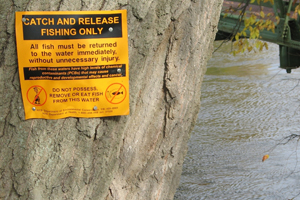 |
With 700 stakeholders, isn´t it time you joined the PEN?
PEN writes new chapter in stakeholder cooperation for elimination of PCBs
“The PCBs elimination network: the information exchange platform created for the risk reduction of polychlorinated biphenyls (PCBs)” by Andrea Warmuth and Kei Ohno (Secretariat of the Basel, Rotterdam and Stockholm Conventions, UNEP), appears in the January 2013 issue of the Journal of Epidemiology and Community Health."
|
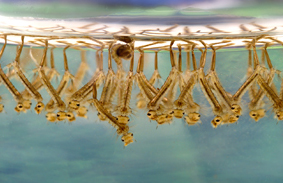 |
The Conference of the Parties to the Stockholm Convention, in accordance with the World Health Organization recommendations and guidelines, allows the use of the insecticide DDT in disease vector control to protect public health.
Stockholm Convention continues to allow DDT use for disease vector control
Fourth meeting of the DDT Expert Group assesses continued need for DDT, 3–5 December 2012, Geneva
The Conference of the Parties to the Stockholm Convention, in accordance with the World Health Organization recommendations and guidelines, allows the use of the insecticide DDT in disease vector control to protect public health.
The fourth meeting of the DDT Expert Group reviewed the latest information as part of this ongoing assessment of the continued need for DDT, including that provided by the Parties for the period of three years from 2009-2011.
|
 |
1 November 2012, Geneva - The Secretariat of the Basel, Rotterdam and Stockholm Conventions is deeply saddened to learn of the passing of Mr. Sergey Eduardovich Tikhonov.
Message of Condolence to the Family, Friends and Colleagues of the Late Sergey E. Tikhonov
 
Mr. Sergey Eduardovich Tikhonov
(September 23, 1948 - October 26, 2012) The Secretariat of the Basel, Rotterdam and Stockholm Conventions is deeply saddened to learn of the passing of Mr. Sergey Eduardovich Tikhonov, a leader in the Commonwealth of Independent States (CIS) in the field of sound chemicals and waste management. Mr. Tikhonov died in Moscow, Russian Federation, on Friday, 26 October 2012.
Mr. Tikhonov headed the Autonomous Non-Profit Organization Centre for International Projects (ANO-CIP), based in Moscow, and served as director of the Stockholm Convention Regional Centre for capacity-building and transfer of environmentally sound technologies and the Basel Convention Regional Centre for Countries of the CIS.
Over a long and distinguished career, Mr. Tikhonov cooperated with the United Nations Environment Programme on awareness-raising and capacity-building initiatives in support of the chemicals and wastes conventions. He also supported a variety of public right-to-know mechanisms, including Earthwatch / International Register of Potentially Toxic Chemicals (IRPTC) and national Pollutant Release and Transfer Registers.
Sergey Tikhonov’s dedication and inspiring nature will long be remembered by those who were privileged to work with him.
Our Secretariat expresses its heartfelt sympathy to his family, friends and the staff of the Regional Centre in this time of sorrow.
|
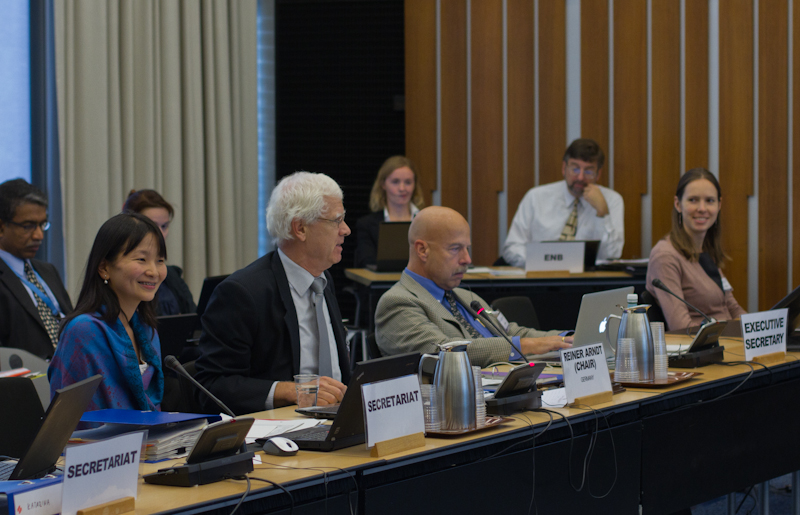 |
Three other chemicals proposed for listing in the Stockholm Convention on POPs are to be evaluated for management of their risks.
19 October 2012, Geneva – A UN expert body has recommended that the industrial flame retardant hexabromocyclododecane (HBCD) be eliminated from the global marketplace to protect human health and the environment. HBCD is used mainly in expanded polystyrene and extruded polystyrene. It is also used in textile coatings and in high impact polystyrene for electrical and electronic equipment.
UN chemical experts recommend that widely used flame retardant be phased out of global production and use
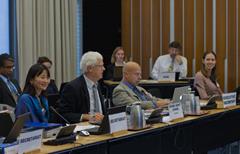 Three other chemicals proposed for listing in the Stockholm Convention on POPs are to be evaluated for management of their risks.
19 October 2012, Geneva – A UN expert body has recommended that the industrial flame retardant hexabromocyclododecane (HBCD) be eliminated from the global marketplace to protect human health and the environment. HBCD is used mainly in expanded polystyrene and extruded polystyrene. It is also used in textile coatings and in high impact polystyrene for electrical and electronic equipment.
The Persistent Organic Pollutants Review Committee, a subsidiary body of the Stockholm Convention on Persistent Organic Pollutants (POPs), adopted a recommendation to include HBCD in the Convention’s Annex A for elimination, with specific exemptions for expanded and extruded polystyrene needed to give countries time to phase-in safer substitutes. The recommendation will now be sent to the Parties to the Stockholm Convention for consideration at the sixth meeting of the Conference of the Parties, scheduled to be held from 28 April to 10 May 2013, in Geneva.
The Committee adopted a total of 12 decisions, including on industrial chemicals chlorinated naphthalenes (CNs) and hexachlorobutadiene (HCBD), and the pesticide pentachlorophenol (PCP) and its salts and esters, which now will move forward to the next stage of review.
The Committee adopted risk profiles of CNs and HCBD. Regarding short-chained chlorinated paraffins, the Committee agreed that the information was currently insufficient to support a decision on the risk profile and agreed to consider any new information that may be made available to the Committee and to consider the chemical again at its eleventh meeting.
“As the premier scientific body supporting the global elimination of persistent organic pollutants, the POPs Review Committee has built upon its past successes and recommended yet another highly toxic POP – HBCD – for global elimination, and made great progress in its work on several other hazardous chemicals,” said Jim Willis, Executive Secretary of the Basel, Rotterdam and Stockholm Conventions.
Note for Editors:
The Stockholm Convention on POPs regulates chemicals that are persistent, bioaccumulative and toxic, to protect human health and the environment globally. Article 8 of the Convention entails the reviewing process of new chemicals and Annex D, Annex E and Annex F specify the information required for the review.
The POPs Review Committee consists of thirty-one scientific experts elected by the Conference of the Parties to the Stockholm Convention charged with undertaking scientific review of chemicals proposed for listing. The Committee met in Geneva, Switzerland, from 15 to 19 October 2012.
Chlorinated naphthalenes were used for decades for wood preservation, as an additive to paints and engine oils, and for cable insulation and in capacitors. Until the 1970s, CNs were high volume chemicals.
Hexachlorobutadiene was a widely used fumigant used to control pests and as an industrial solvent. HCBD also occurs as a by-product during production of other chlorinated solvents.
Pentachlorophenol (PCP) is an organochlorine compound used as a pesticide and a disinfectant. A wealth of data on the adverse effects of pentachlorophenol in mammals show developmental, immunotoxic and neurotoxic effects. Human survivors of toxic exposures may suffer permanent visual and central nervous system damage.
Short-chained chlorinated paraffins (SCCP) are a group of industrial chemicals used in metalworking, and the formulation and manufacturing of products such as polyvinyl chloride (PVC) plastics and metalworking fluids. They are of concern because they are persistent, have been found in remote areas such as the Arctic, and could accumulate to levels that are toxic to fish and other aquatic organisms.
The ninth meeting of the POPs Review Committee will be held in Rome, Italy, from 14 to 18 October 2013 back-to-back with the Chemical Review Committee of the Rotterdam Convention on the Prior Informed Consent Procedure for Certain Hazardous Chemicals and Pesticides in International Trade.
The following ten persistent organic pollutants had been recommended previously to the Conference of the Parties by the POPs Review Committee and have now been added to the Convention:
Contact:
Kei Ohno, Programme Officer, Secretariat of the Basel, Rotterdam and Stockholm Conventions (UNEP), Geneva, tel. +41 (22) 917 8201, e-mail: kohno@pops.int
Michael S. Jones, Public Information Officer, Secretariat of the Basel, Rotterdam and Stockholm Conventions (UNEP), Geneva, tel. +41-22-917-8668; (m) + 41-79-730-4495, e-mail: SafePlanet@unep.org
|
 |
Updated as well as new draft guidance to develop, review and update national implementation plans now available for use and commenting by Parties.
Guidance to develop, review and update NIPs now available
A newly developed guidance on National Implementation Plan (NIP) development, review and update is now available. As per decision SC-5/14 parties are encouraged to provide the Secretariat with comments on how to improve the usefulness of the guidance. The deadline for sending comments is 31 January 2012.
|
 |
Candidate chemicals to be considered for listing in Annexes A, B, and/or C to the Stockholm Convention on Persistent Organic Pollutants
UN committee reviews risk profiles of five chemicals
 Candidate chemicals to be considered for listing in Annexes A, B, and/or C to the Stockholm Convention on Persistent Organic Pollutants
11 October 2012, Geneva – The Persistent Organic Pollutants Review Committee (POPRC), a subsidiary body of the Stockholm Convention on Persistent Organic Pollutants (POPs), will consider five chemicals proposed for listing in Annexes A, B, and/or C to the Convention, a step which helps eliminate POPs and protect human health and the environment.
The Committee will consider draft risk profiles of chlorinated naphthalenes, hexachlorobutadiene, a revised draft risk profile of short-chained chlorinated paraffins, and further consider its recommendation to the COP on the listing of hexabromocyclododecane. The Committee will also consider the proposal for listing pentachlorophenol and its salts and esters.
The Committee will then discuss assessment of alternatives to endosulfan, DDT, and the use of PFOS in open applications. ‘Open applications’ is a term used in contrast to applications found in closed systems. In the case of application of a chemical in a closed system, no significant quantities of the chemical are expected to reach humans and the environment during their production and use. With open applications, the opposite is the case.
The Committee will further consider climate change and POPs, the evaluation of brominated diphenyl ethers and PFOS, its salts and PFOSF, work in collaboration with other scientific bodies and the effective participation of parties in the Committee’s work.
The eighth meeting of the POPRC will be held at the Conference Centre Varembé in Geneva, Switzerland, from 15 to 19 October 2012.
Announcements about the meeting will be tweeted @brsmeas.
Contact:
Kei Ohno, Programme Officer, Secretariat of the Basel, Rotterdam and Stockholm Conventions (UNEP), Geneva, tel. +41 (22) 917 8201, e-mail: kohno@pops.int
Michael S. Jones, Public Information Officer, Secretariat of the Basel, Rotterdam and Stockholm Conventions (UNEP), Geneva, tel. +41-22-917-8668; (m) + 41-79-730-4495, e-mail: SafePlanet@unep.org
|
 |
Winning and highly commended entries were exhibited at the United Nations Office at Geneva from 20 June to 11 July 2012.
Global art contest for children and youth: winners announced here!
 The exhibition of artwork featuring 13 winning entries as well as a selection of other entries opened on 20 June 2012 at the United Nations Office of Geneva. The exhibition ran through 11 July.
To mark the tenth anniversary of the Convention in May 2011, the Secretariat of the Stockholm Convention on persistent organic pollutants organized a global art contest for children and youth on the theme "Stockholm at 10: Chemical Challenges, Sustainable Solutions" and what this means to young people around the world.
One hundred and sixty submissions, mainly drawings and paintings, were received from 18 countries. Due to the low number of entries submitted in the photography and video categories, as well as their insufficient relevance, the jury decided not to award any prizes for these art categories.
The exhibition of winning drawings/paintings was on display in the Passerelle of the Palais des Nations, Geneva (Entrance 40 from Pregny Gate). The exhibition opening coincided with the opening of Rio+20, the United Nations Conference on Sustainable Development, in Rio de Janeiro, Brazil.
Three of the Stockholm Convention’s Regional Centres organized parallel virtual exhibitions of the winning entries:
To view the winning artwork and all other entries:
  
To view the speeches made at the exhibition opening:
Speech by Mr. David Chikvaidze
Chairman of the Cultural Activities Committee
|
 |
Speech by Mr. David Ogden
Acting Chief of Conventions Operations Branch
|
 |
To view the opening reception pictures:
The Secretariat would like to congratulate the winners and warmly thank all of the artists for their participation in this contest!
|
 |
The Secretariat of the Basel, Rotterdam and Stockholm conventions cordially invites children and youths to participate in a unique global contest.
"Chemical Challenges, Sustainable Solutions" global art contest for children and youth to be featured during UN Conference on Sustainable Development
 Geneva, 29 November 2011 – The Secretariat of the Basel, Rotterdam and Stockholm conventions cordially invites children and youths 5 to 20 years of age to participate in a unique global contest highlighting the ways persistent organic pollutants (POPs) enter people’s bodies, change ecosystems, and affect the life of our planet.
The Stockholm Convention’s 10th anniversary global art contest, “Chemical Challenges, Sustainable Solutions” was announced at the 5th meeting of the Conference of the Parties to the Convention, in May 2011. The Stockholm Convention was adopted on 22 May 2001 in Stockholm, Sweden.
POPs are substances that persist for a long time in the environment. They build up in the bodies of animals and are toxic. By altering hormonal balances and damaging the immune systems of exposed individuals as well as their offspring, POPs can affect generations of humans. Years or even decades after exposure, POPs can also cause cancer and harm a person’s ability to reproduce.
Children are among the most sensitive populations to many types of pollutants, including POPs.
The contest will explore the reasons why the planet’s “chemical temperature” is rising and how people can protect themselves and nature from these harmful substances.
The contest is open to children 5 to 10, youths 11 to 15 and young adults 16 to 20 years of age, working in three art media categories:
- Drawing
- Photography
- Short videos
The contest opens on 1 January 2012 and the deadline for entering the contest is 16 March 2012. National entries are to be submitted through your country’s Official Contact Point. Full details of the contest rules and eligibility may be found at the Stockholm Convention website (in English, French and Spanish).
Each country can submit up to 27 entries (9 per art media category, in which 3 per age category).
Winning entries will be displayed at the European Headquarters of the United Nations during the Rio+20 United Nations Conference on Sustainable Development in Rio de Janeiro, Brazil, on 20-22 June 2012, as well as appear electronically at the Rio+20 conference venue and in the Stockholm Convention’s Regional Centres across the world.
In celebration of the Stockholm Convention’s 10th anniversary and in recognition of the International Year of Chemistry 2011, the Czech Republic launched its national art contest at the beginning of the academic year 2011-12. The International Year of Chemistry 2011 is a worldwide celebration of the achievements of chemistry and its contributions to the well-being of humankind proclaimed by the United Nations.
Ms. Kateřina Šebková, an expert on chemicals at the Czech Republic’s Ministry of Environment, said: "We were pleased to see the initiative for the 10th anniversary of the Stockholm Convention, and as the current goals of this contest meet three out of four goals set up for the International Year of Chemistry, we simply had to join to further help raise awareness of the significance of chemicals among the general public. We are a very active Party and also host the Central and Eastern European POPs centre for the Stockholm Convention, so we will also try to pursue the idea regionally. Now is the time to join the contest!"
Contact:
Michael Stanley-Jones, Press Focal Point/Public Information Officer, Secretariat of the Basel, Rotterdam and Stockholm Conventions, +41-22-917-8668; (m) + 41-79-730-4495, e-mail: msjones@pops.int
|
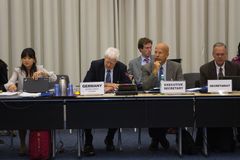 |
Stockholm Convention POPs Review Committee assesses hazards of two industrial chemicals nominated for elimination and agrees to prepare guidanceon alternatives to pesticide endosulfan.
UN experts target toxic flame retardant HBCD for control under global chemicals treaty
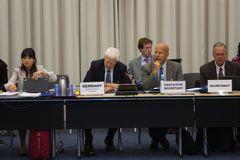 Stockholm Convention POPs Review Committee assesses hazards of two industrial chemicals nominated for elimination and agrees to prepare guidance on alternatives to pesticide endosulfan.
Geneva (Switzerland), 14 October 2011 – The Persistent Organic Pollutants Review Committee, a scientific body to the Stockholm Convention on Persistent Organic Pollutants (POPs), took action this week to help eliminate POPs from the global marketplace and protect human health and the environment. The Committee adopted more than a dozen separate decisions, including one recommending that the chemical hexabromocyclododecane (HBCD) be listed under the Convention.
HBCD is a flame retardant used mainly in polystyrene. It is also used in textile coatings and in high impact polystyrene for electrical and electronic equipment. HBCD was proposed by Norway for listing under the Convention as a chemical slated for elimination from the global marketplace.
“With this week’s decisions, the POPs Review Committee has again cleared the high bar set by Governments for rigorous scientific review of chemicals proposed for action and advanced the global agenda of eliminating the world’s most dangerous toxic chemicals,” said Jim Willis, Executive Secretary of the Basel, Rotterdam and Stockholm Conventions.
Meeting for the seventh time, the committee of 31 scientific experts initiated risk profiles of two industrial chemicals newly proposed for elimination under the global chemicals treaty. The committee found evidence that chlorinated naphthalenes and hexachlorobutadiene are persistent organic pollutants, which bio-accumulate in organisms (i.e. increases in concentration up the food chain), are transported over long distances from their sources, and are toxic to the environment and human health.
Chlorinated naphthalenes (CNs) were used for decades for wood preservation, as additive to paints and engine oils, and for cable insulation and in capacitors. Until the 1970s, CNs were high volume chemicals. Hexachlorobutadiene (HCBD) was a widely used fumigant used to control pests and as an industrial solvent. HCBD also occurs as a by-product during production of other chlorinated solvents.
The Committee agreed to continue its assessment of a third chemical, pentachlorophenol (PCP), which is an organochlorine compound used as a pesticide and a disinfectant.
All three chemicals were proposed by the European Union for consideration for listing under the Convention.
The Committee also agreed to prepare guidance on alternatives to the pesticide endosulfan, expanding its work into a new area recently mandated by the Parties to the Convention. Endosulfan, which is commonly used to control agricultural pests, was added to the Convention’s list of 22 POPs at the fifth meeting of the Conference of the Parties in April 2011.
In addition, the Committee agreed to evaluate the POPs characteristics of the chemical alternatives to DDT. DDT is widely used in tropical and sub-tropical countries to control mosquitoes which serve as a vector for the deadly malaria parasites.
The Committee examined implications of the 2011 study, Climate Change and POPs: Predicting the Impacts and agreed to develop guidance on evaluating how global warming processes affect the fate, transport and toxicity of POPs.
The seventh meeting of the Persistent Organic Pollutants Review Committee was held from 10 - 14 October 2011 in Geneva, Switzerland.
Note to Editors
The Persistent Organic Pollutants Review Committee (POPRC) is composed of 31 members appointed by the Conference of the Parties – who are all highly placed scientists representing their regions around the globe. The meetings of the Committee are also open to observers from the NGO community, industry, research organizations and governments. Its mandate is to review proposals to add new chemicals to the Stockholm Convention.
POPs are substances that are persistent and toxic and can affect generations of humans. Exposure to POPs is known to effect health and can be the source of cardiovascular disease, metabolic disorders and cancer. Some POPs are also considered to be endocrine disrupters and by altering the hormonal system, can also damage human reproductive and immune systems.
Currently, there are twenty-two chemicals listed in the Convention, including DDT, lindane, PCBs and dioxins and furans and some brominated flame retardants. The objective of the Convention is to restrict and eliminate these chemicals from production and use in order to protect human health and the environment. The Convention has 176 Parties as of 14 October 2011.
Since the beginning of its operations, the POPRC has recommended ten chemicals for listing and all ten were accepted by the Conference of the Parties of the Convention. Amendments incorporating the first nine of these chemicals into the annexes of the Convention entered into force on 26 August 2010. The tenth amendment, which will add endosulfan to Annex A, is pending entry into force in accordance with the procedure provided in Article 22 of the Convention.
The study, Climate Change and POPs: Predicting the Impacts, which was released at the 26th session of the UNEP Governing Council/Global Ministerial Environment Forum, in Nairobi, in February 2011, highlighted the ways global warming increases the volubility and long-range mobility of some POPs, with potentially harmful impacts on vulnerable populations.
For More Information Please Contact:
Kei Ohno, Programme Officer, Secretariat of the Stockholm Convention, Geneva, +41 (22) 917 8201, e-mail: kohno@pops.int
Michael Stanley-Jones, Public Information Officer, Joint Services of the Basel, Rotterdam and Stockholm Conventions, UNEP Geneva, + 41 (22) 917 8668; (m) + 41 79 730 4495, e-mail: msjones@pic.int or SafePlanet@unep.org
Further information is available at https://www.pops.int or by emailing ssc@pops.int.
Register to the Briefing on the outcomes of the seventh meeting of POPRC webinar
|
 |
Stockholm Convention POPs Review Committee will also consider risk management options for flame retardant HBCD.
UN chemical body set to review three new chemicals for global action
 Geneva (Switzerland), 7 October 2011 – The Persistent Organic Pollutants Review Committee, a scientific body to the Stockholm Convention on Persistent Organic Pollutants, will meet next week to review three new chemicals proposed for listing under the global chemicals treaty. The Committee will have before it new proposals for listing chlorinated naphthalenes, hexachlorobutadiene, and pentachlorophenol, its salts and esters in Annexes A, B and/or C to the Stockholm Convention.
Chlorinated naphthalenes (CNs) were used for decades for wood preservation, as additive to paints and engine oils, and for cable insulation and in capacitors. Until the 1970s CNs were high volume chemicals. Hexachlorobutadiene was a widely used fumigant used to control pests. Pentachlorophenol (PCP) is an organochlorine compound used as a pesticide and a disinfectant. All three chemicals were proposed by the European Union for consideration for listing under the Convention.
The committee will also evaluate possible control measures for the chemical hexabromocyclododecane (HBCD), the last step on the road to considering whether to phase the chemical off the global marketplace. HBCD is a flame retardant used mainly in polystyrene. It is also used in textile coatings and in high impact polystyrene for electrical and electronic equipment. HBCD was proposed by Norway for listing under the Convention.
The committee will consider information requirements for the risk profile of short-chained chlorinated paraffins (SCCP). SCCP are a group of industrial chemicals used in metalworking, and the formulation and manufacturing of products such as polyvinyl chloride (PVC) plastics and metalworking fluids. They are of concern because they are persistent, have been found in remote areas such as the Arctic, and could accumulate to levels that are toxic to fish and other aquatic organisms.
The seventh meeting of the Persistent Organic Pollutants Review Committee (POPRC7) will be held from 10 to 14 October 2011 at the Conference Centre Varembé in Geneva (Website: www.cicg.ch; Address: 9-11 Rue de Varembé, Geneva).
A provisional agenda of the meeting is set out in document UNEP/POPS/POPRC.7/1.
Note to Editors
The Persistent Organic Pollutants Review Committee (POPRC) is composed of 31 members appointed by the Conference of the Parties– who are all highly placed scientists representing their regions around the globe. The meetings of the committee are also open to observers from the NGO community, industry, research organizations and governments. Its mandate is to review proposals to add new chemicals to the Stockholm Convention.
A chemical can be listed in the Stockholm Convention as a persistent organic pollutant when it shows that it persists in the environment, bioaccumulates in organisms (increases in concentration up the food chain), travels through the environment over long distances from the region of its release to other regions of the globe, and is toxic to the environment and human health.
Currently, there are twenty-two chemicals listed in the convention including DDT, lindane, PCBs and dioxins and furans and some brominated flame retardants. The objective of the convention, which has 175 Parties as of 19 September 2011, is to restrict and eliminate these chemicals from production and use in order to protect human health and the environment.
Since the beginning of its operations, the POPRC has recommended ten chemicals for listing and all ten were accepted by the Conference of the Parties of the Convention. Amendments incorporating the first nine of these chemicals into the annexes of the Convention entered into force on 26 August 2010. The tenth amendment, which will add endosulfan to Annex A, is pending entry into force in accordance with the procedure provided in Article 22 of the Convention.
Further information is available at www.pops.int and https://chm.pops.int/tabid/221/Default.aspx or by emailing ssc@pops.int.
Contact
Kei Ohno, Programme Officer, Secretariat of the Stockholm Convention, Geneva, +41 (22) 917 8201, e-mail: kohno@pops.int
Michael Stanley-Jones, Press Focal Point/Public Information Officer, Joint Services of the Basel, Rotterdam and Stockholm Conventions, UNEP Geneva, + 41-22-917-8668; (m) + 41-79-730-4495, e-mail: msjones@pic.int or SafePlanet@unep.org
Download
Please click here to download this press advisory.
|
 |
Geneva, 14 June 2011 - The Multilateral Environmental Agreements Information and Knowledge Management Initiative (MEA IKM), launched today develops harmonized MEA information systems to assist Parties and the environment community at large access information from multiple agreements from one location. Supported by UNEP the initiative currently includes 17 MEAs from 12 Secretariats hosted by three UN organizations and IUCN.
Launch of InforMEA – the United Nations Information Portal on Multilateral Environmental Agreements (MEAs)
 Geneva, 14 June 2011 - The Multilateral Environmental Agreements Information and Knowledge Management Initiative (MEA IKM), launched today develops harmonized MEA information systems to assist Parties and the environment community at large access information from multiple agreements from one location. Supported by UNEP the initiative currently includes 17 MEAs from 12 Secretariats hosted by three UN organizations and IUCN. It is open to observers involved in MEA information and data management.
The first project– InforMEA, the United Nations Information Portal on Multilateral Environmental Agreements – was launched on 14 June at the occasion of the initiative’s 2nd Steering Committee Meeting, attended by Ms. Maria Louisa Silva, Executive Secretary of the Barcelona Convention, Mr. John Scanlon, Secretary General of Convention on Trade in Endangered Species (CITES), and Mr. Jim Willis, Executive Secretary of the Basel, Rotterdam and Stockholm Conventions.
“With the launch of InforMEA the global environmental community has taken a major stride forward in making access to information more transparent and easier to apply in solving the complex challenges we face in the Information Age”, Achim Steiner, UN Under-Secretary General and Executive Director, United Nations Environment Programme (UNEP)
The InforMEA Portal presents Conference of the Parties decisions and resolutions, news, calendars, events, country specific MEA Membership, national focal points, as well as in the near future national reports and implementation plans organized against a set of 200 hierarchical terms taken from MEA Conference of the Parties (COP) Agendas.
In contrast to similar endeavors this project harvests and displays information directly from MEA Secretariats websites and data bases, who remain the custodians of their data. This allows for accurate and timely data availability in a cost effective manner. MEA secretariats individually implement the technical solution identified.
Harmonization of information standards and formats will facilitate the development of many other knowledge tools among conventions. For example, the Convention on Migratory Species and CITES could display the species listed on their respective appendices or the Stockholm Convention may feature decisions related to endangered migratory species threatened by POPs. Once such an application is developed, the tool is maintained at minimal cost.
www.informea.org - Making key MEA information “speak to one another”
For further information please contact: Marcos Silva (CITES) and marcos.silva@cites.org, and Eva Duer (UNEP) eva.duer@unep.org, (respective MEA representative)
|
 |
Representatives from 127 Governments meeting in Geneva last week at the fifth meeting of the Conference of the Parties agreed to add endosulfan to the list of POPs to be eliminated worldwide.
COP5: Endosulfan included under the Stockholm Convention
 Geneva, Switzerland, 3 May 2011 - Representatives from 127 Governments meeting in Geneva last week agreed to add endosulfan to the United Nations’ list of persistent organic pollutants to be eliminated worldwide. The action puts the widely-used pesticide on course for elimination from the global market by 2012.
The decision was among more than 30 measures taken by Parties to the Stockholm Convention on Persistent Organic Pollutants (POPs) to boost global action against POPs.
The Parties agreed to list endosulfan in Annex A to the Convention, with specific exemptions. When the amendment to the Annex A enters into force in one year, endosulfan will become the 22nd POP to be listed under the Convention.
A Party may extend the phase out period of the pesticide by five years but only for a small number of uses.
"The conference recognized that financial and technical support is required to facilitate the replacement of the use of endosulfan in developing countries and countries with economies in transition," said UN Under-Secretary General and UNEP Executive Director Achim Steiner.
"In establishing a consultative process on finance for the chemicals and waste conventions, UNEP has responded to the need of those countries by seeking to make the sound management of hazardous chemicals a development priority of the green economy in which all countries can fully and fairly participate," he added.
"New POPs present new challenges, as we are usually dealing with chemicals that are still widely used commercially," said Jim Willis, the newly appointed Executive Secretary of the Basel, Stockholm, and UNEP-part of the Rotterdam Convention Secretariats. "Parties have demonstrated that they can find creative solutions to speed the elimination of POPs and protect environment and human health from these dangerous chemicals."
The conference evaluated the continued need for DDT for disease vector control to combat mosquitoes carrying the deadly malaria parasite. On the basis of available scientific, technical, environmental and economic information, it saw a continued need to use DDT while effective alternatives were being sought and implemented by an increasing number of countries.
"Despite all efforts, malaria remains one of the world’s tragedies with almost a million fatalities every year. All means are needed to combat this vector," said Victoria Mupwaya, director of the Environmental Council of Zambia.
The first assembly of the Global Alliance for alternatives to DDT, held on the 26 April 2011, concurred with the WHO findings. Although there is no deadline for the elimination of DDT, the goal of the Alliance is to reduce reliance on DDT for disease vector control by strengthening countries capacities to deploy safer alternatives.
The conference requested UNEP to take over administration of the Global Alliance, in collaboration with the World Health Organization. UNEP was also requested to take over the PCB Elimination Network.
Monique Barbut, chief executive officer of the Global Environment Facility (GEF), speaking at the "Finance Forum for Sustainable Solutions" on the opening day of the conference, announced the GEF would provide USD 250,000 in support to countries to update their national implementation plans in response to the adoption of new POPs to the Convention. In total, the GEF had in recent years funded more than USD 1 billion to address implementation of hazardous chemicals and waste cluster agreements.
Seven new Stockholm Convention regional centres were endorsed by the conference: in Algeria, Kenya, India, Iran, Senegal, South Africa and the Russian Federation. The Russian region centre is conditional on the Russian Federation’s ratification of the Convention.
Karel Blaha (Czech Republic) was elected president of the conference on the opening day. Osvaldo Alvarez (Chile) was elected to serve as president of the 6th meeting of the conference, to be held in May 2013.
Over 700 participants took part in the conference, which was held from 25 to 29 May 2011. Under the theme, Stockholm at 10: Chemical Challenges, Sustainable Solutions, the conference marked the 10th anniversary of the adoption of the Convention in 2001.
Contacts
Nick Nuttall, UNEP Spokesperson, tel: +254 20 7623084 or email: nick.nuttall@unep.org
David Ogden, Coordinator, Stockholm Convention secretariat, tel: +41 22 917 8161 or email: dogden@pops.int
Michael Stanley-Jones, Public Information Officer, mobile/text message: +41 (0)79 730 4495 or email: msjones@pops.int
|
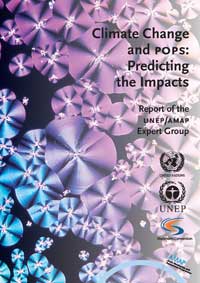 |
A systematic and authoritative global review of the impacts of climate change on the dynamics and toxicity of POPs has been released jointly by the Secretariat of the Stockholm Convention and the Arctic Monitoring and Assessment Programme (AMAP) at the UNEP Governing Council, in February 2011. The report of the UNEP/AMAP expert group, ‘’ Climate change and POPs: Predicting the Impacts’’, provides a comprehensive view of the complex inter-linkages between climate and POPs.
Climate change and POPs: Predicting the Impacts
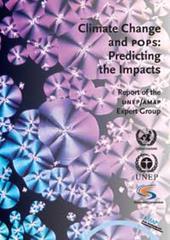 Nairobi, 21 February 2011 - Climate change increases the planet’s vulnerability to highly toxic chemicals, according to a global study released jointly by the Stockholm Secretariat and the Arctic Monitoring and Assessment Programme (AMAP) at the UNEP Governing Council today.
The first systematic and authoritative review of the impact of climate change on the release of POPs into the environment, their long range transport and environmental fate, and human and environmental exposure found that climate change threatens to undermine the Stockholm Convention’s effort to reduce exposures to POPs.
Donald Cooper, the Executive Secretary of the Stockholm Convention says "Robust information on processes leading to increased levels of POPs in the environment, higher exposure of ecosystems and human populations, and increased toxicity of chemicals is essential to allow appropriate policy responses through the Stockholm Convention and regional and national strategies to address the complex challenge posed by POPs and global environmental change."
Increased POPs emissions triggered by global warming increases the availability of POPs to enter the food chain, threatening the health of humans and animals.
Higher temperatures can make wildlife more sensitive to exposure of certain pollutants. In the Arctic region, climate change can alter the exposure levels of marine mammals, such as seals or the polar bears, through a variety of means including changes in long-range atmospheric and oceanographic transport along with the melting of the ice caps.
The study suggests that the expected increase in the incidence of vector-borne diseases, such as malaria, associated with climate change may increase demand for and release of DDT in some regions.
The study, “Climate Change and POPs: Predicting the Impacts”, was conducted by climate and chemical experts from 12 countries. The study was jointly published by the Secretariat of the Stockholm Convention and Arctic Monitoring and Assessment Programme (AMAP). The full study will be presented to the 5th meeting of the Parties to the Stockholm Convention in April 2011. The objective of the Stockholm Convention is to protect human health and the environment from POPs.
|